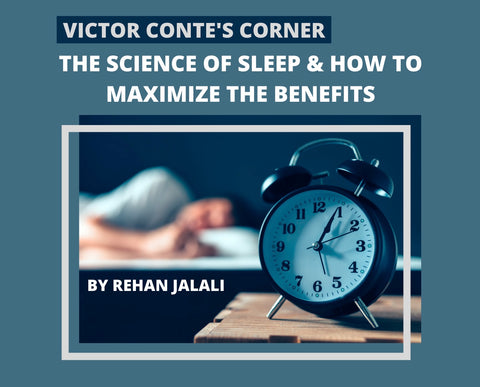
By Rehan Jalali, C.S.N.
From immune function to weight management, sleep is critical to optimal health, especially during the Covid-19 pandemic. Here’s how to get the 7-9 hours per night that you need.
We have a sleep crisis in this country. According to the Centers for Disease Control (CDC), at least one-third of Americans don’t get enough sleep (7-9 hours) on a regular basis. A survey in Consumer Reports estimates that 27% of people regularly have trouble sleeping or staying asleep, and a whopping 68% struggle with sleep at least once a week.
Our sleep crisis is felt by every age group and demographic—and it’s costing us. Americans spend $411 billion every year treating insomnia and other sleep disorders, and more than nine million adults take some kind of prescription drug for sleep disorders.
But worse than the price tag is the impact of inadequate sleep on our bodies. Scientists have found evidence that lack of sleep can cause molecular changes that promote weight gain. About 3-5% of obesity is the result of inadequate sleep, according to the Harvard School of Public Health. And findings from British researchers show that inadequate sleep more than doubles the risk of death from cardiovascular diseases.
The Covid-19 pandemic has only made the problem worse. With increased stress from self-isolation, financial worries and other concerns, getting a good night’s sleep is tougher than ever. And considering the link between sleep and the immune system, it’s never been more critical to get 7-9 hours of deep, restful sleep per night.
If you are one of the millions who suffer from lack of sleep, it’s time to get serious about your shut-eye.
What actually causes us to sleep at night? Contrary to popular belief, it’s not watching TV while laying on the couch. Sleep is regulated by circadian rhythms generated by the circadian pacemaker in the hypothalamus (part of the brain), which control hormones in the body. The pineal gland, in turn, releases melatonin, then converts it into the hormone serotonin, which helps us fall asleep. Melatonin production is inhibited by light, so your body produces more melatonin at night.
The Five Stages of Sleep
The five stages occur cyclically during the night. A typical person may complete five cycles during a full night’s sleep.
Stage 1: Drowsiness. Stage 1 may last for five to 10 minutes.
Stage 2: Light Sleep. The heart rate slows and body temperature decreases. At this point, the body prepares to enter deep sleep.
Stages 3 and 4: The Deep Stages. These stages are known as delta or slow-wave sleep. They are critical in the healing, recovery and brain cleansing process that sleep provides. Stage 4 is more intense than Stage 3.
Stage 5: REM (rapid eye movement). REM sleep is when dreams come alive. Brain activity is actually high during this stage and your pulse increases as well. Intense dreaming occurs during REM sleep as a result of heightened cerebral activity, but paralysis occurs simultaneously in the major voluntary muscle groups. The first period of REM typically lasts 10 minutes, with each recurring REM stage lengthening and the final one lasting about an hour.
Detrimental Effects of Sleep Deprivation
Here are just some of the harmful consequences of inadequate sleep.
Tips to Improve Sleep
As you can see, getting 7-9 hours of quality sleep is critical. Here’s how to maximize the benefits of sleep and help improve your overall health and fitness.
Supplements to Help Maximize Sleep Benefits
Here are some over-the-counter dietary supplements that may help improve the quality of your sleep.
Melatonin—This natural hormone of the pineal gland can intensify REM sleep and may also support healthy GH levels. It’s essential in promoting proper sleep and can even help with jet lag. One very recent study even showed that it can help with COVID-19 symptoms.
5-HTP (5-hytroxytryptophan)—5-HTP is the intermediate metabolite in the serotonin pathway and is basically the direct precursor to the neurochemical. Serotonin is a key factor in determining sleep, appetite, mood and other bodily functions, including pain control. 5-HTP has been shown to help improve sleep quality and even treat insomnia in some cases by supporting REM sleep.
ZMA— ZMA is a highly absorbable combination of zinc, magnesium, and vitamin B-6. This unique vitamin/mineral combination can have a positive impact on health, fitness and even exercise performance. But when it comes to sleep benefits, ZMA really delivers.
The bio-available form of magnesium and B-6 in ZMA are keys to a more deep and restful sleep. Magnesium basically primes your body for a good night's sleep. Research indicates that a magnesium deficiency can disrupt sleep quality. Vitamin B-6 can enhance dream vividness and recall. One Italian study found that “the administration of nightly melatonin, magnesium and zinc appears to improve the quality of sleep and the quality of life in long-term care facility residents with primary insomnia.”
Another study out of Iran showed that taking magnesium (roughly the same amount contained in each serving of ZMA) improved sleep efficiency and sleep time, and reduced insomnia. What’s important about this study is that it also showed that nightly magnesium supplementation increased morning wakefulness.
Naps Are Great, But You Need Your Nightly Shut-eye
If you were wondering about naps, they definitely help. One study published only a few months ago showed that a 90-minute nap improved memory and brain function. If you want to help improve your immune system, overall health and athletic performance—especially during the Covid-19 pandemic—you really do need to get at least 7-9 hours of quality sleep every night.
Sweet dreams!
References
https://fortune.com/2016/11/30/sleep-productivity-rand-corp-411-billion/
https://www.nbcnews.com/healthmain/sleepless-states-nearly-9-million-pop-pills-shut-eye-8C11026819
https://www.nih.gov/news-events/nih-research-matters/molecular-ties-between-lack-sleep-weight-gain
https://www.hsph.harvard.edu/nutritionsource/sleep/
https://warwick.ac.uk/newsandevents/pressreleases/short_sleep_increases/
https://www.ncbi.nlm.nih.gov/pubmed/32227222
https://www.ncbi.nlm.nih.gov/pubmed/?term=sleep+deprivation+alters+neutrophil+functions
https://www.ncbi.nlm.nih.gov/pubmed/?term=%5Bsleep+and+immune+system%5D+2018+rev+alerg
https://www.ncbi.nlm.nih.gov/pubmed/19134176
https://www.ncbi.nlm.nih.gov/pubmed/30559151
https://www.ncbi.nlm.nih.gov/pubmed/22259064
https://www.ncbi.nlm.nih.gov/pubmed/28164452
https://www.ncbi.nlm.nih.gov/pubmed/25012962
https://www.ncbi.nlm.nih.gov/pubmed/25002497
https://www.ncbi.nlm.nih.gov/pubmed/31997771
https://www.ncbi.nlm.nih.gov/pubmed/25733101
https://www.ncbi.nlm.nih.gov/pubmed/31361895
https://www.ncbi.nlm.nih.gov/pubmed/27397854
https://www.ncbi.nlm.nih.gov/pubmed/31380740
https://www.ncbi.nlm.nih.gov/pubmed/31613456
https://www.ncbi.nlm.nih.gov/pubmed/29845764
https://www.ncbi.nlm.nih.gov/pubmed/25535358
https://www.ncbi.nlm.nih.gov/pubmed/29665762
https://www.ncbi.nlm.nih.gov/pubmed/28460563
https://www.ncbi.nlm.nih.gov/pubmed/32347747
https://www.ncbi.nlm.nih.gov/pubmed/9727088



